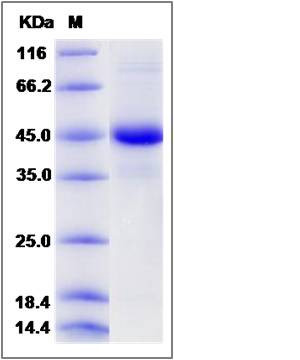Mouse BAMBI / NMA Protein (Fc Tag)
2610003H06Rik
- 100ug (NPP3184) Please inquiry
| Catalog Number | P50895-M02H |
|---|---|
| Organism Species | Mouse |
| Host | Human Cells |
| Synonyms | 2610003H06Rik |
| Molecular Weight | The recombinant mouse BAMBI /Fc is a disulfide-linked homodimer. The reduced monomer comprises 367 amino acids and has a predicted molecular mass of 41 kDa. The apparent molecular mass of the protein is approximately 45 kDa in SDS-PAGE under reducing conditions due to glycosylation. |
| predicted N | Glu 27 |
| SDS-PAGE |  |
| Purity | > 90 % as determined by SDS-PAGE |
| Protein Construction | A DNA sequence encoding the mouse BAMBI (Q9D0L6) (Met1-Ala152) was expressed, fused with the Fc region of human IgG1 at the C-terminus. |
| Bio-activity | |
| Research Area | Immunology |Cytokines & Growth Factors |Cytokine & Receptor |Transforming Growth Factor Beta (TGF-beta) Superfamily |Transforming Growth Factor Beta (TGF-beta) Family |TGF-beta Family Modulator | |
| Formulation | Lyophilized from sterile PBS, pH 7.4 1. Normally 5 % - 8 % trehalose, mannitol and 0.01% Tween80 are added as protectants before lyophilization. Specific concentrations are included in the hardcopy of COA. |
| Background | BMP and activin membrane-bound inhibitor (BAMBI) is a transmembrane glycoprotein that is a pseudoreceptor of type 1 receptors. BAMBI structurally lacks intracellular serine/ threonine kinase domain but with an extracellular domain and a short cytoplasmic region that share sequence similarities with type 1 receptors, whose members have functions in signal transduction in various developing and pathological processes. BAMBI competes with the type 1 receptor, a receptor of the transforming growth factor-beta (TGF-beta), through functioning as negative regulators of TGF-beta by limiting the signaling range of the TGF-beta family during early embryogenesis. The expression of BAMBI can be induced by accumulated beta-catenin and BMP. The expression level of BAMBI was found aberrantly elevated in most colorectal and hepatocellular carcinomas relative to the corresponding non-cancerous tissues. It suggestes that beta-catenin and TGF-beta interfere growth arrest by inducing the expression of BAMBI, and this may contribute to colorectal and hepatocellular tumorigenesis. |
| Reference |
